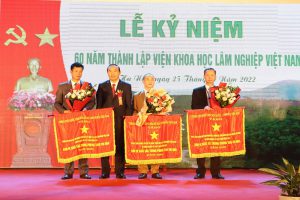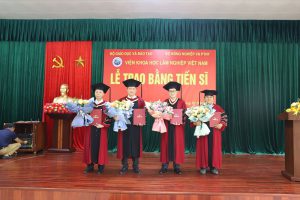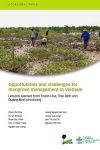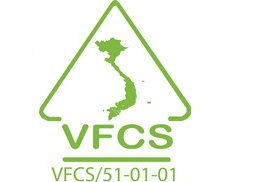Part 1. The general characteristics, advantages and difficulties
Year 2008 is the key time for the 5 year plan of 2006-2010. It was also an important year for preparing to go to in the process of the conversion into self-sufficient budget mechanism of FSIV and its units as a science and technology organization according to the Decree 115/2005/ND-CP.
Year 2008 is the fourth year FSIV has participated in tendering for science, technology and environment topics. FSIV has been awarded 14 topics and projects at ministerial level and one independent topic at state level. All research topics will be implemented by early 2009.
Organizational structure:
FSIV has 1 Director General, 4 Deputy Directors Generals. It comprises 3 functional divisions, 6 research divisions, 15 centres, and 1 sub-institute. FSIV employs 607 staff, including 431 regular and 176 irregular staff, 0.5% Professor and Asso. Professor, 3.1% Doctor graduates, 16.3% Master of Science graduates, 47% engineers and university graduates, and 32.9% middle level and workers.
Advantage:
under the direct guidance of the Directorate, activities of FSIV were carried out on time and effectively in combination by the qualified workforce and young and active researchers. This year, MARD has assigned a large number of research topics and projects to FSIV.
Difficulties:
– The research topics are required to cut costs while labour and material costs are increasing.
– The basic research topics and technical standard formation topics were sometimes endorsed too late by MARD combined with a long hard cold weather in the north region, drought in the south region and landslides, each which caused damage to experimental layout.
– Research topics and tasks were assigned unequally between research areas and among units.
– Research activities of FSIV have been implemented across the whole country while the number of staff working at functional divisions were reduced, so it has been difficult to monitor and check work of the research topics.
– The stipulations about carrying out conversion of FSIV and units under FSIV to self-sufficient funding mechanism according to Decree 115 starting from 1 January, 2010 have not been developed.
Part 2. Tasks of 2008
In 2008, FSIV implemented a total of 90 research topics and environment, science and technology tasks with a total funding of 31.8 billion VND; 20 topics and 661 Projects with total funds of 6.2 billion VND; 8 contracts on forestry extension with total funds of 1.7 billion VND; 3 seed projects worth 8.7 billion VND; 6 equipment and tool strengthening projects worth 3.9 billion VND; 3 construction and repair projects of a small size worth 1.03 billion VND; 6 basic construction projects worth 20.2 billion VND; 15 tasks of international cooperation worth 3.8 billion VND; training of 26 P.h.D students worth 195 million VND; carried out more than 141 scientific contracts, services, production and doing business with total fund is 46.2 billion VND. Total funds for the whole of FSIV was around 141.48 billion VND for the year 2008, an increase of over 18% compared to 2007. However, MARD requested FSIV save 1.71 million VND and the total expenditure was 139.77 billion VND.
Part 3. Results of research implementation
3.1. Silviculture area
– Identified lignin gene arrangement of E. uropylla; histogenic techniques of cicatrical tissue, root, bud invitro and gene transformation GUS and indicator gene expression in 10 Pinus merkusii. Development of isolation technique, cleaning ADN, and purification of 22 microsatellites bait couples of A. auriculiformis.
Recognition of three national seeds and five technically advanced seeds by MARD of hybrid acacia and eucalyptus applied to Tam Thanh, Tan Lap and Binh Dien districts and other similar areas. These seed achieved a growth rate 16-40m3/ha/year.
Formulated soil classification criteria for some tree species used in production forests in some key areas and set up software on forestry soil assessment. Identified conditions for planting Schima wallichii, Michelia macclurei and Cedrela odorata, Alnus nepalensia, Pinus caribeae, Scaphium macropodum, Jatropha curcas, E. urophylla, A. mangium, A. auriculiformis, hybrid acacia, and Pinus kesiya.
Established and monitored experiments on forest plantation techniques for Pseudoxytenanthera albociliata, Terninalia calamansanai, Parkia sumatrana, Khaya senegalensis, Ailanthus triphysa, Canarium album, Hopea odorata, hybrid Acacia, A. auriculiformis, A. mangium, E. urophylla, Pinus carbiaea, bamboos, Allophylus dimorphus, Carcinia fagraeoides, Cinnamomum balansea, Dalbergia tonkinensis, Camellia oleifera, Schima wallichii, Michelia macclurei, Cedrela odorata, and Jatropha curcas.
Established models for mangrove forest restoration in shrimp ponds which had been left fallow, and intensive melaleuca forest. Formulated technical guidance for forest plantations on semi-submerged land. Proposed pest and insect management measures for Cedrela odorata; identified biological characteristics of insects and disease damaged Rhizophia apiculata forest in Can Gio Reserve.
3.2. Forest industry area
Four technical advancements were recognized, including termite control preservative replacing TM67 preservative; mould control preservative for forest products; forest product preservatives from oil of cashew nut bark; and termite control preservative for construction works from oil of cashew nut bark.
Identified the active substance of neem oil, and tannin which affects the control of insect damage to forest products. Identified prosthetic types, solvent and rate of composition to produce 2-3 types of preservative preparations.
Surveyed the natural duration of 10 types of wood from forest plantations and identified preservation treatment regime for white Acacia timber using products CHg and XM5, resulting in their life span being four times longer.Completed preparation production technology and wood preservation by the product XM5 used outside for making pole for dragon fruit and pepper tree.
3.3. Forestry economic and policy area
To provide principals and methods to identify forest valuation comprising economic and environmental values applied in formulating Decrees and Circulars on forest valuation and pilot policies relating to payment for forest environmental services. Synthesized several scientific bases on development of the current situation, competitive capacity of enterprises at medium and small scale for tea, coffee products and fine art furniture and policies used for enterprises.Evaluated the current situation of practicing slash and burn cultivation in Lao Cai, Son La, Cao Bang and Ha Giang provinces. Proposed economic and technical solutions supporting farmers who use slopping land in a sustainable way. Set up a data base serving the project on livelihood improvement for people living in and around Xuan Son national park.Formulated 6 volumes of technical guidelines for participatory planning.
3.4. Seed project, forestry extension topics and 661 projects.
a. Seed project-
Project on tree seeds for timber purpose serving economic forest plantations: established 46 ha of seed orchards and seed library garden of A. auriculiformis, A. mangium, E. urophylla, E. cloeziana, and Hopea odorata. Transfer technology for cutting propagation for 5 units, and tissue culture for 4 units; – Seed improvement project of native tree species supplying forest enrichment and forest tending and regeneration promotion: conversed 410 ha of seed forest; selected 711 plus trees of native species; and harvested seeds of 164 plus trees for 4 native tree species.- Forest seed development project supplying forest plantations on coastal sand areas, acid sulphate soil and mangrove forests: selected 151 plus trees of Meulaleuca cajaputy, Australia Meulaleuca spp., Rhizophia apiculata, and Bruguier spp. Established 8 ha nursery of Meulaleuca, 15 ha seed orchard of Neem. Conversed 10 ha of seed orchard of Meulaleuca.
b. Forestry extension:
Eight forestry extension contracts on technical transfer and model establishment on hybrid Acacia, A. mangium, A. mangium, Eucalyptus, Pinus caribeae, Dipterocarpus alatus, Calamus tetradactylus, grafting canarium, and Eucalyptus.
c. Research topics, project 661:
Eight units implemented 10 tasks of science and technology under the 661 program and 10 units carried out projects under 661 on forest plantation, forest tending and regeneration promotion, forest management and protection and other items such as fire break, fence, and botanical garden on land they manage.
3.5. International cooperation:
FSIV is carrying out projects in collaboration with international organizations over the world including CIFOR, ACIAR, CARD, JICA, Tropenbos, Oxfam, and some others. In 2008, MARD approved the Viet Nam Forestry Research Strategy until 2020 and FSIV submitted the “Future of Forests in Viet Nam: Outlook for 2020” to FAO, which has been approved by FAO.Organized a national Conference on “Mangrove Forest Restoration and Development for Climate Change Adaptation”. FSIV has hosted more than 40 scientists and experts from different international organizations to discuss cooperation opportunities in forestry. FSIV has sent staff abroad over 60 times for studying and participating in seminars and conferences. FSIV proposed programs and projects in collaboration with international organizations.
3.6. Doing service on science and business. FSIV has implemented 141 contracts relating to unit specialties, this earnt FSIV 46.224 billion VND.
3.7. Consultation on science, technology and environment delegated by MARD.
Formulated the project to conserve Ficus spp, and successfully applied cutting propagation.Defined tree species and proposed solutions for protecting and developing of Cinnamomum camphora Tree in Nam Dinh province. Participated in MARD team surveying in the desert and proposed research plans to plant trees on coral reef flats.Participated in the formulation of a pilot policy to pay for forest environmental services and circulars on forest valuation methods.Prepared a report on rubber plantations on forestry land;
3.8. Post-graduate
Training FSIV signed contracts with Thai Nguyen Agriculture University and Western High Plateau University on training collaboration and preparation of text book for students.In 2008, there were 21 staff participating in training and 39 Engineering students and 14 Masters students successfully defended their thesis. There were 20 PhD studying at FSIV.
3.9. Documentation and information
Issued four volumes of Forestry Science Journal, and publised 18 books serving training and technology transfer, 69 articles in Vietnamese, and 9 articles in English. 3.10. Preparation for conversion of FSIV and Centres into fund self-sufficient mechanism according to the Decree 115 of the government.Being aware of the important role of the conversion mechanism according to the Decree 115 of the government, the Directorate of FSIV guided to Centres, functional divisions, research divisions to implement it by themself. However, there is still lack of suitable guidances as well as mechanism and policies from the higher ranking offices,
Part 4. Solutions for implementing tasks for the year 2009
4.1. Management and operation of FSIV
Strengthen the management and operating effectiveness of FSIV and the coordination between research divisions with regional centres. Prepare to implement the process of being funded at a fixed rate for research topics and adjust inappropriate issues in the process of planning for the implementation. Through the activities of research topics, projects and service contracts, the income of staff will be improved.
To formulate the regulations for the running of FSIV based on the self-sufficient mechanism, and self responsibility the whole of FSIV.
4.2. Personnel organization
Complete the regulations of science and technology activities of FSIV and then seek approval of MARD. Base on this approval, FSIV will approve the regulations of centres and sub-institute.
4.3. Plans on topics and projects on science, technology and environment
Strengthen the consultative function of the Scientific Council in defining tasks for science, technology and environment during 2009-2010 and research tasks which will be submitted to MARD for approval.Strengthen FSIV’s consulting, checking and monitoring activities. Enhance the quality of research topics as well as the application of high technology in conducting research and transfer into production.
4.4. International cooperation
Strengthen research cooperation and technology transfer with international organizations and formulate new projects combining international cooperation and training staff in both English and their specialty.
4.5. Staff training Improve the quality of Ph.D theses and link research with the training of staff.
4.6. Information and documentation
Set up a webpage with updated information on research results. Enhance the quality of the journal.
4.7. Finance and accountants
Improve the competence and skills of young accountants. Participate more in research monitoring and evaluation and speed up liquidation of topics, projects and construction work.
4.8. Recommendations to MARD:
– Early issue of research cost norm;
– Approval of regulations for science and technology of FSIV;
– Issue stipulations concerning mechanisms under Decree 115 of Government.






